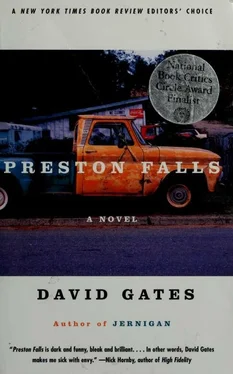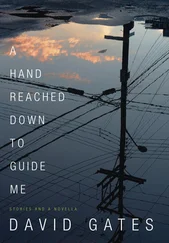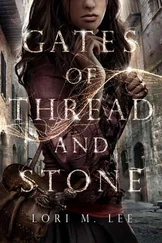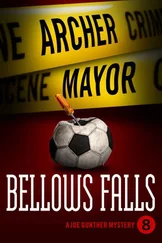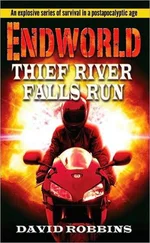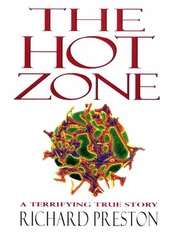He's taken the plates to the sink and begun running water, when his
I 2 7
mother says, "Oh, leave those and come for a walk. I have something to show you."
"And what might that be?"
"You'll see."
He opens his eyes wide and flutters his fingers again. She smiles.
They walk up the old overgrown road that goes behind the house and through the gap in the stone wall. Geoffrey follows this far, then turns back, meowing piteously. Past here you have to push through the saplings that have grown up in the track. A bright-blue sky, but it's turned chilly overnight; Willis left Preston Falls without a jacket, so he's put on a flannel shirt that belonged to his father. They step over the brook where it cuts across the trafl and continue uphill. The old spring-house was over to the left: now it's just a glimpse of gray, mossy boards lying among the raspberry bushes. They follow the stone wall and the line of thick old maple trees, regularly spaced. Once, this was a real road, leading to a long-gone farm.
They pass the cellar hole his father called the Griffin place and keep walking uphill. In what used to be an orchard, his mother stops and touches a rotten old apple tree. "This is it," she^ays. "No, wait. I think I'm turned around. That one." She points to a different tree, similarly ancient and deformed, nearer to the stone wall. "That's where you were conceived."
"Out here?" he says. "Al fresco? My God, you were a couple of bohemians."
"It was just about this time of year — well, obviously, since you were born in July. It wasn't quite so cool, but of course it was later in the day. Dear God, it does come back. We made a little nest of all our clothes. Right there, in that patch of sunshine."
"What do you know," he says. He walks over to the spot. Tufts of grass, ferns, old rotted leaves. A flat rock, flush with the ground. With clothes under them, they wouldn't have felt it. He gets down on one knee, digs his fingers under the edge of the rock and lifts it: ants. He lets the rock back down, stands up and brushes off the knee of his jeans. "And you're sure that time was the one."
"Oh, no question," she says. "This wasn't one of our. . better periods, shall we say. Though of course not as bad as — you know — it got."
"Right." He looks at the flat rock.
"I never told this to anyone," she says. "But it's so odd: when I woke up this morning I just had the strongest feeling about it. And I remem-
PRESTON FALLS
bered it so clearly. It frightened me all of a sudden — do you know? — to be the only person alive who knew about it. Because for that just to be gone, for it never to have even happened, in a way… I think if you hadn't been here I would've called poor Elaine Cooper and burdened her with it."
"Well," he says. "I mean, I'm glad you told me…"
"I thought you ought to know. Because it was — it's your story, really, more than mine."
"Right," he says.
"Well, so now you know." She shakes her head. "It kills me that it's not precious to you." She begins to weep, then quickly stops herself. "But I suppose it's one more chicken come home to roost, isn't it?"
He puts an arm around her; she seems to shrink and harden. "I'm sorry," he says. "It means a lot to me, that you, you know, brought me here and everything."
"Stop it," she says.
"I'm sorry," he says.
Silence. Then a crow starts cawing.
"I thought someday," she says, "you might want to bring your children here, because. . This is all crazy, isn't it?"
"Of course not."
"Would you know your way back here?" she says. "If you wanted to come sometime?"
"Sure. I actually know this spot. He and I used to come through here hunting."
"Oh dear," she says. "Yes, and I used to worry so about you."
"And all for naught," he says, bright and breezy.
Another move or two and she'll say Shall we? and they'll start back for the house and that'll be that.
"You won't come back here," she says. "You'll forget I ever told you this." She looks back down the hill, toward the old cellar hole. "Well. Shall we?"
He rolls into the dooryard at three in the morning, still buzzed from the coffee he got at the Dunkin' Donuts in Rutland. He lies down on the couch, pulls the comforter over him and picks up Our Mutual Friend. No point in trying to go to sleep until he's cooled out a little. By daylight he's polished it off. Piece of shit, basically.
He gets up, finds The Mystery of Edwin Drood and settles back in, but drifts off into a thing where Jasper in the opium den gets confused with Hildegard Behrens trying to take his pants down, except Willis doesn't know what Hildegard Behrens looks like, so he's using his mother's friend Elaine Cooper for her. It's probably a pun, and he's telling himself he's lost his bearings — that would be about his speed. But at least it's not another thing about the fucking devil.
He wakes to the phone ringing, jumps up and goes running,
"Hey, man," the voice says. "It's Reed."
"Uh-huh? Yeah?"
"What did I, wake you up? Listen, man, you going to come rock and roll tonight?"
"Shit."
"I think I woke you up," says Reed. "You get my messages?"
"I was in New Hampshire. Shit, what time is it?"
"Noon? Something like that. So you remember how to get there, right?"
"I don't know, man. I'm fuckin' beat."
"Yeah yeah. So go back to sleep and we'll see you over there like nine o'clock, right?"
"I don't know," says Willis. "Maybe."
"Hey, we got to have our swingin' guit-tar man. Plus we, ah, have mucho business to discuss, you and me. I got your statement here, which we need to go over together."
PRESTON FALLS
"Shit," says Willis. "Yeah, okay. I may not stay all that late."
"Cool. We'll talk about that too."
Willis pisses away what's left of the day reading Drood and falling asleep and reading more Drood. For what it's worth, he figures out that Datchery, the guy who shows up out of nowhere, has to be Bazzard, Mr. Grewgious's clerk. Who the fuck else can it be? He wakes up from another nap, and it's dark outside. Time to make some coffee and hit the trail. Feels like he's coming down with something. Well, if the coffee wakes him up enough to get there, the drugs will keep him going. Though coming home last week was a little hairy. Still, it's great doing cocaine and playing rock and roll, or even just standing around being high with guitars and shit. No wonder it's such a thing. Bending over to put his boots on, he thinks he should at least change these socks. But.
He stops for gas in Preston Falls, and it's so chilly he pulls the hood of his sweatshirt over his Raiders cap and sticks his left hand in his pocket while he pumps. And this is only what, the middle of September. Still summer, technically.
When he gets to the farm, the gila monster's glowing on the porch roof and everybody's parked up by the barn. He opens his door to a blast of cold air and the smell of woodsmoke. You can hear them playing what turns out to be "Get Out of My Life, Woman," with real drums. Willis exhales and sees his breath. He's lugged his guitar and amp into the barn as far as the bottom of the stairs, when they finish with a ragged collective whomp.
"Soundin' good!" he calls.
A hand parts the plastic sheeting, and Philip Reed's foxy face appears. "My man. Give me one second.''
Through the plastic Willis sees a blurry form lift a blurry guitar shape over its head. Then out comes Reed and down the stairs; he bats Willis's hand away from the handle of the Twin and carries it up himself. Willis can hear his ragged breathing. "Hell to get old," Reed says. "Here." He parts the plastic for Willis. Inside, the stove has made it stuffy, and everybody's down to t-shirts.
"Hey, how's it going," says the Strat guy.
"Hey," the bass player says.
Читать дальше
